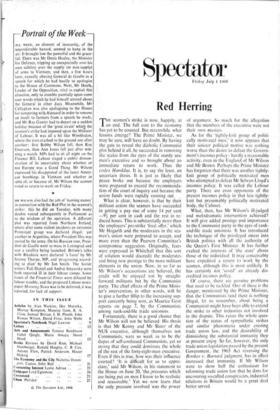Red Herring
THE seamen's strike is now, happily, at an end. The full cost to the economy has yet to be counted. But meanwhile, what lessons emerge? The Prime Minister, we may be sure, will have no doubt. By having the guts to reveal the diabolic Communist plot behind it all, he succeeded in removing the scales from the eyes of the sturdy sea- men's executive and so brought about an immediate return to work. Thus the codex Haroldus. It is, to say the least, an uncertain thesis. It is just as likely that peace broke out because the employers were prepared to exceed the recommenda- tion of the court of inquiry and because the union funds were rapidly running out.
. What is clear, however, is that by their militant action the 'seamen have succeeded in getting a pay rise of some 14 per cent per cent in cash and the rest in re- duced hours. This is substantially more than the employers' pre-strike 'final offer.' which Mr Hogarth and the moderates in the sea- men's union were prepared to accept. and more even than the Pearson Committee's compromise suggestion. Originally, fears were expressed in Whitehall that this sort of solution would discredit the moderates and bring new prestige to the more militant elements in the union. Now, in so far as Mr Wilson's accusations are believed, the credit will be enjoyed not by straight- forward militants but by the Communist party. The chief effects of the Prime Minis- ter's intervention, in other words, will be to give a further fillip to the increasing sup- port currently being won, as Maurice Gent reports on page 7, by the Communists among rank-and-file trade unionists. Fortunately, there is a good chance that Mr Wilson will not be believed. His thesis is that Mr Kenny and Mr Slater of the NUS executive, although themselves not Communists.; were so weak as to be the dupes of self-confessed Communists, yet so strong that they could dominate the whole of the rest of the forty-eight-man executive. Even if this is true, how was their influence exerted? 'It is difficult for us to appre- ciate,' said Mr Wilson, in his statement to the House on June 20, 'the pressures which are being put on men I know to be realistic and reasonable.' Yet we now learn that the only pressure involved was the power of argument. So much for the allegation that the members of the executive were not their own masters.
As for the 'tightly-knit group of politi- cally motivated men,' it now appears that their sinister political motive was nothing worse than the desire to defeat the Govern- ment's incomes policy : hardly a treasonable activity, even in the England of Mr Wilson and Mr Brown. Perhaps the Prime Minister has forgotten that there was another tightly- knit group of politically motivated men who attempted to defeat Mr Selwyn Lloyd's incomes policy. It was called the Labour party. There are even opponents of the present incomes policy in that less tightly- knit but presumably politically motivated body, the Cabinet.
What, then, has Mr Wilson's ill-judged and melodramatic intervention achieved? It will give added prestige and importance to the Communist party in the eyes of rank- and-file trade unionists. It has introduced the technique of the privileged smear into British politics with all the authority of the Queen's First Minister. It has further exalted the interests of 'the state' above those of the individual. It may conceivably have expedited a return to work by the seamen, although this is most unlikely. It has certainly not 'saved' an already dis- credited incomes policy.
Of course, there are genuine problems that need to be tackled. One of these is the danger, mentioned by the Prime Minister, that the Communists (and there is nothing illegal, let us remember, about being a Communist) might have been able to extend the strike to other industries not involved in the dispute. This raises the whole ques- tion of the status of sympathetic strikes and similar phenomena under existing trade union law, and the desirability of diminishing the substantial immunity they at present enjoy. So far, however, the only trade union legislation passed by the present Government, the 1965 Act reversing the Rookes v. Barnard judgment. has in effect increased that immunity. if Mr Wilson were to show half the enthusiasm for reforming trade union law that he does for uncovering so-called conspiracies, industrial relations in Britain would be a great deal better served.






























 Previous page
Previous page